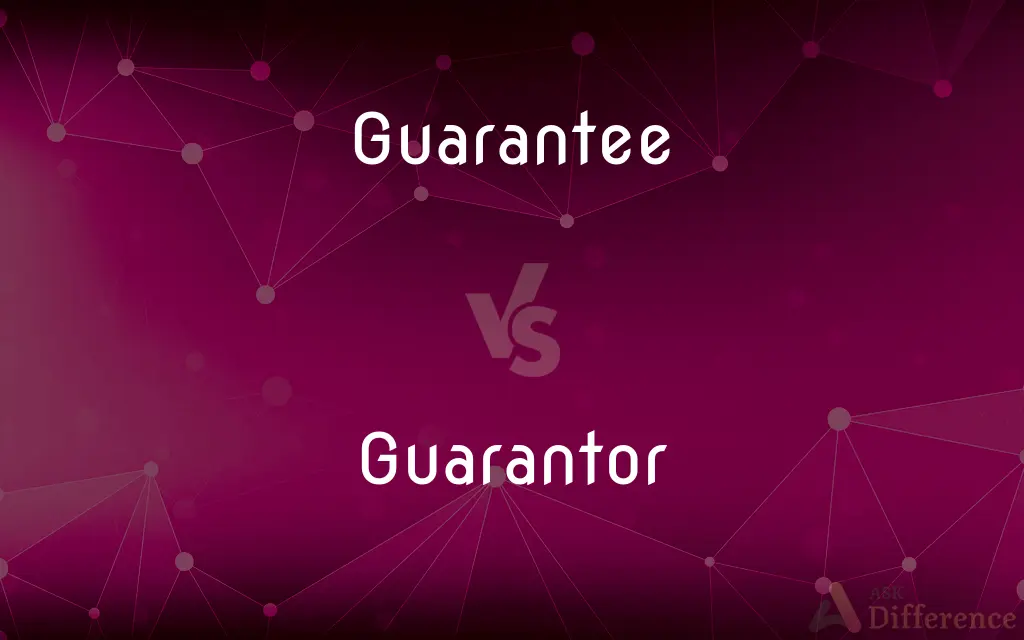Guarantee vs. Guarantor — What's the Difference?
By Urooj Arif & Fiza Rafique — Updated on March 15, 2024
A guarantee is a formal promise ensuring the fulfillment of a condition or obligation, while a guarantor is an individual or entity that provides this assurance, backing the performance or financial obligation.

Difference Between Guarantee and Guarantor
Table of Contents
ADVERTISEMENT
Key Differences
A guarantee is essentially a contractual agreement or assurance that certain conditions will be met, such as the quality of a product, performance of a service, or repayment of a loan. It serves as a security measure for the beneficiary, ensuring that they receive what has been promised or can claim compensation if the terms are not fulfilled. On the other hand, a guarantor is the party that agrees to fulfill the obligation if the primary party fails to do so. This role is common in financial agreements, where a guarantor assures the lender that the loan will be repaid, stepping in to make payments if the borrower defaults.
Guarantees can be found in various contexts, from consumer goods, where they assure product quality or performance, to financial loans, ensuring repayment. These guarantees provide confidence and trust in transactions, fostering smoother relations between parties. Whereas, guarantors are often involved in financial services, real estate leases, and loan agreements, providing a safety net that enables the primary party to secure a service or loan they might not have qualified for on their own.
The involvement of a guarantee in a transaction or agreement typically requires the guarantor to have a good credit history or sufficient resources to meet the potential obligation. This reassurance is crucial for the agreement's beneficiary, as it reduces the risk of default or failure to meet the agreed terms. In contrast, the guarantor takes on a risk, as they must be prepared to fulfill the obligation if called upon.
While guarantees focus on the obligation itself and the assurance that it will be met, guarantors are evaluated based on their ability to meet these obligations if necessary. The decision to act as a guarantor should not be taken lightly, as it can involve significant financial risk and legal implications if the primary obligor fails to meet their commitments.
Both guarantees and guarantors are integral to ensuring the fulfillment of obligations in various agreements. Guarantees provide the assurance needed to secure trust in transactions, while guarantors back this assurance with their commitment to step in if the original party defaults.
ADVERTISEMENT
Comparison Chart
Definition
A formal assurance or promise regarding an obligation or condition.
An individual or entity that provides a guarantee.
Role
Ensures the fulfillment of a specific condition or obligation.
Commits to fulfilling the obligation if the primary party fails.
Common Uses
Product warranties, loan repayments, service quality.
Loan agreements, lease agreements, financial transactions.
Requirement
Depends on the agreement's terms and conditions.
Requires good credit history or sufficient resources.
Risk
Lies with the beneficiary if the guarantee is not fulfilled.
Lies with the guarantor if the primary obligor defaults.
Compare with Definitions
Guarantee
A legal mechanism to ensure obligations are met.
The guarantee in the contract made the investors feel secure.
Guarantor
An individual or company that supports financial agreements.
As guarantors, they were responsible for the loan if the borrower defaulted.
Guarantee
A formal promise to ensure the quality or performance of a product or service.
The manufacturer offers a one-year guarantee on all its appliances.
Guarantor
An entity or person that agrees to be responsible for another's debt or obligation.
Her parents acted as guarantors for her first car loan.
Guarantee
Protection for consumers against defective goods.
Customers can rely on the guarantee to replace faulty products.
Guarantor
Someone who provides a guarantee for a loan or lease.
The guarantor signed the agreement, ensuring the bank's repayment.
Guarantee
An assurance that a loan or financial obligation will be repaid.
The bank required a guarantee for the loan.
Guarantor
A party that backs up a promise or performance of a contract.
The company acted as a guarantor for the contractor's work.
Guarantee
A commitment to meet specific conditions or standards in an agreement.
The contractor provided a guarantee that the work would be completed on time.
Guarantor
A role that involves taking on potential financial risk to support another's obligation.
Becoming a guarantor meant she could be called to cover the payments.
Guarantee
Guarantee is a legal term more comprehensive and of higher import than either warranty or "security". It most commonly designates a private transaction by means of which one person, to obtain some trust, confidence or credit for another, engages to be answerable for him.
Guarantor
One, such as a person or corporation, that makes or gives a promise, assurance, or pledge typically relating to quality, durability, or performance.
Guarantee
A formal assurance (typically in writing) that certain conditions will be fulfilled, especially that a product will be repaired or replaced if not of a specified quality
The treaty provides a guarantee of free trade
We offer a 10-year guarantee against rusting
Guarantor
One who makes or gives a guaranty.
Guarantee
An undertaking to answer for the payment or performance of another person's debt or obligation in the event of a default by the person primarily responsible for it.
Guarantor
A person or company that provides a guarantee.
Guarantee
Provide a formal assurance, especially that certain conditions will be fulfilled relating to a product, service, or transaction
The company guarantees to refund your money
Guarantor
One who makes or gives a guaranty; a warrantor; a surety.
Guarantee
Promise with certainty
No one can guarantee a profit on stocks and shares
Guarantor
One who provides a warrant or guarantee to another
Guarantee
Something that assures a particular outcome or condition
Lack of interest is a guarantee of failure.
Guarantee
A promise or assurance, especially one given in writing, that attests to the quality or durability of a product or service.
Guarantee
A pledge that something will be performed in a specified manner.
Guarantee
A guarantor.
Guarantee
A guaranty.
Guarantee
To assume responsibility for the debt, default, or miscarriage of.
Guarantee
To assume responsibility for the quality or performance of
Guarantee a product.
Guarantee
To undertake to do, accomplish, or ensure (something) for another
Guaranteed to free the captives.
Guarantees freedom of speech.
Guarantee
To make certain
The rain guarantees a good crop this year.
Guarantee
To guaranty.
Guarantee
To furnish security for.
Guarantee
To express or declare with conviction
I guarantee that you'll like this book.
Guarantee
Anything that assures a certain outcome.
Can you give me a guarantee that he will be fit for the match?
Guarantee
A legal assurance of something, e.g. a security for the fulfillment of an obligation.
Guarantee
More specifically, a written declaration that a certain product will be fit for a purpose and work correctly; a warranty
The cooker comes with a five-year guarantee.
Guarantee
The person to whom a guarantee is made.
Guarantee
(colloquial) A person who gives such a guarantee; a guarantor.
Guarantee
To give an assurance that something will be done right.
Guarantee
To assume or take responsibility for a debt or other obligation.
Guarantee
To make something certain.
The long sunny days guarantee a good crop.
Guarantee
In law and common usage: A promise to answer for the payment of some debt, or the performance of some duty, in case of the failure of another person, who is, in the first instance, liable to such payment or performance; an engagement which secures or insures another against a contingency; a warranty; a security. Same as Guaranty.
His interest seemed to be a guarantee for his zeal.
Guarantee
One who binds himself to see an undertaking of another performed; a guarantor.
Guarantee
The person to whom a guaranty is made; - the correlative of guarantor.
Guarantee
In law and common usage: to undertake or engage for the payment of (a debt) or the performance of (a duty) by another person; to undertake to secure (a possession, right, claim, etc.) to another against a specified contingency, or in all events; to give a guarantee concerning; to engage, assure, or secure as a thing that may be depended on; to warrant; as, to guarantee the execution of a treaty.
The United States shall guarantee to every State in this Union a republican form of government.
Guarantee
A written assurance that some product or service will be provided or will meet certain specifications
Guarantee
A pledge that something will happen or that something is true;
There is no guarantee that they are not lying
Guarantee
A collateral agreement to answer for the debt of another in case that person defaults
Guarantee
Give surety or assume responsibility;
I vouch for the quality of my products
Guarantee
Make certain of;
This nest egg will ensure a nice retirement for us
Preparation will guarantee success!
Guarantee
Promise to do or accomplish;
Guarantee to free the prisoners
Guarantee
Stand behind and guarantee the quality, accuracy, or condition of;
The dealer warrants all the cars he sells
I warrant this information
Common Curiosities
How does a guarantee benefit the consumer?
A guarantee benefits the consumer by providing assurance of product quality, service performance, or loan repayment, reducing the risk of financial loss.
What is the primary function of a guarantee?
The primary function of a guarantee is to ensure that specific obligations or conditions are met, offering assurance to the beneficiary of the agreement.
Who can be a guarantor?
A guarantor can be any individual or entity with sufficient creditworthiness and resources to cover the obligation if the primary party fails to meet it.
What risks does a guarantor face?
A guarantor faces the risk of having to fulfill the obligation if the primary party defaults, which could include financial loss and legal responsibility.
Is it possible to withdraw from being a guarantor?
Withdrawing from being a guarantor can be challenging and typically requires the agreement of all parties involved, as it affects the assurance provided to the beneficiary.
Can a guarantee be transferred?
Whether a guarantee can be transferred depends on its terms and conditions. Some guarantees are specific to the original purchaser or agreement and may not be transferable.
What is the difference between a co-signer and a guarantor?
A co-signer is jointly responsible for the obligation from the start, whereas a guarantor is only responsible if the primary party fails to meet their obligation.
Can businesses act as guarantors?
Yes, businesses can act as guarantors, especially when they have a financial interest in ensuring the success of a project or the financial stability of a partner.
Do guarantees expire?
Some guarantees have specific expiration dates, especially those related to product quality or warranties, while others may remain in effect until the obligation is fully met.
How does one become a guarantor?
To become a guarantor, an individual or entity must agree to the terms of the guarantee, often involving a legal agreement that outlines their obligations if the primary party defaults.
What types of guarantees might require a guarantor?
Guarantees involving significant financial obligations, such as loans, leases, or large purchases, often require a guarantor to provide additional assurance to the lender or seller.
How do lenders view guarantors?
Lenders view guarantors as a form of security that reduces their risk, making them more willing to approve loans or agreements.
What legal protections exist for guarantors?
Legal protections for guarantors vary by jurisdiction but may include requirements for clear communication of obligations, limits on liability, and the right to be notified before being called upon to fulfill the guarantee.
What happens if a guarantor cannot fulfill the obligation?
If a guarantor cannot fulfill the obligation, the lender or beneficiary may take legal action to recover the owed amount, potentially leading to financial or asset loss for the guarantor.
How is a guarantor's liability determined?
A guarantor's liability is determined by the terms of the guarantee agreement, outlining what conditions trigger their responsibility and to what extent.
Share Your Discovery

Previous Comparison
Morose vs. Sad
Next Comparison
Forward vs. OnwardAuthor Spotlight
Written by
Urooj ArifUrooj is a skilled content writer at Ask Difference, known for her exceptional ability to simplify complex topics into engaging and informative content. With a passion for research and a flair for clear, concise writing, she consistently delivers articles that resonate with our diverse audience.
Co-written by
Fiza RafiqueFiza Rafique is a skilled content writer at AskDifference.com, where she meticulously refines and enhances written pieces. Drawing from her vast editorial expertise, Fiza ensures clarity, accuracy, and precision in every article. Passionate about language, she continually seeks to elevate the quality of content for readers worldwide.













































